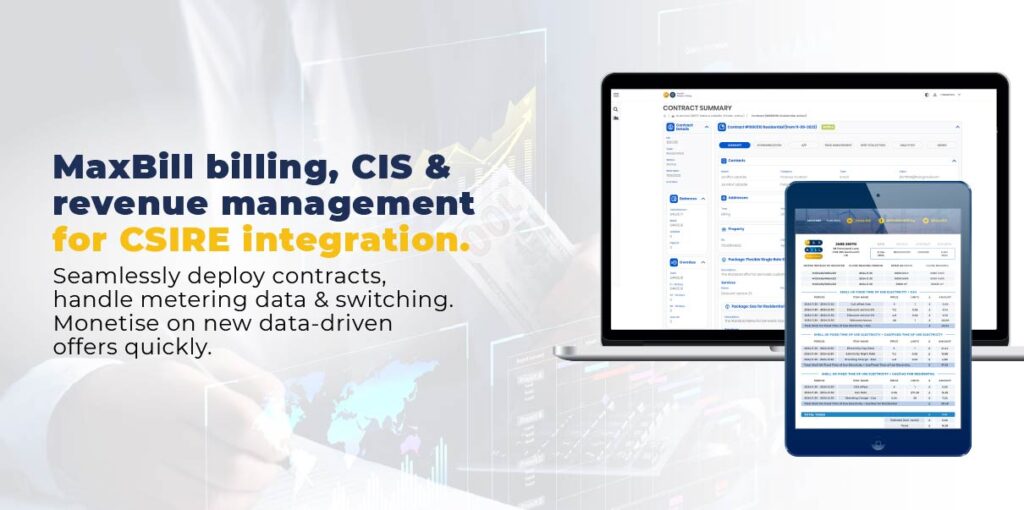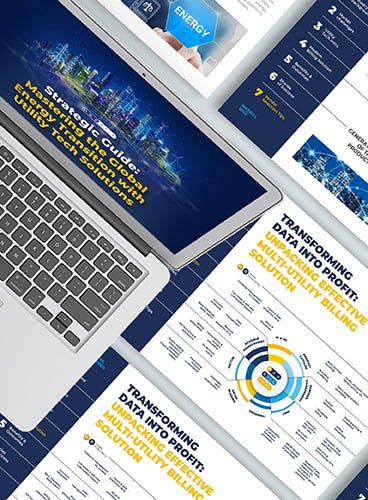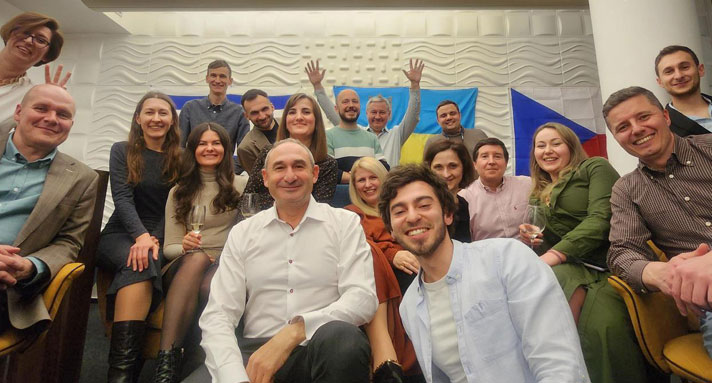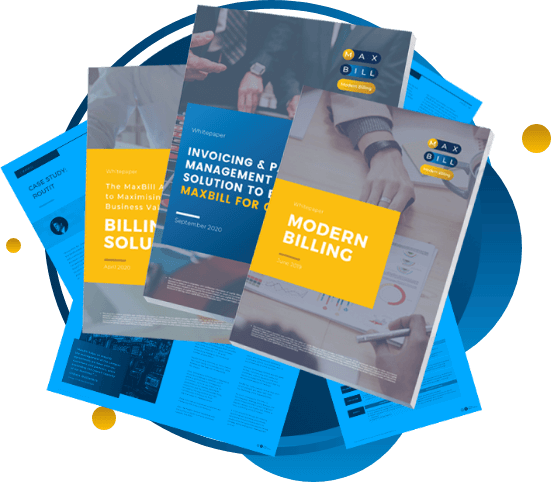The energy suppliers in Poland are actively connecting to CSIRE (Centralny System Informacji Rynku Energii). It’s a significant step for Poland, as it lays the foundation for market liberalisation and substantially supports the energy transition and innovation, which the EU aims to achieve.
The question is, are they about to integrate with a modern, ‘integratable’, and regulation-ready billing system? At MaxBill, we would add another question: will it also allow maximising the potential of the integration within CSIRE and help create more value for consumers?
Here’s the thing: by getting real-time, standardised access to consumer energy data, CSIRE lays the foundation for innovation in tariffs, bundles, and customer experience. And the billing system and CIS should be in place to deliver that, beyond connection-related activities.
In this piece, you will explore:
- Shortly, the ABC of the connection with CSIRE
- What billing capabilities should your system possess
- What opportunities unfold when being connected
- How to monetise them.
Key takeaways
- CSIRE connection is happening right now (starting from July 1, 2025), with its migration and testing timeline that suppliers must follow.
- Billing and CIS of energy suppliers must be able to seamlessly integrate within CSIRE.
- MaxBill suggests that Polish energy suppliers’ billing should not only support connection-related activities but also monetise the opportunities from the CSIRE integration.
- MaxBill billing, CIS, and revenue management enable seamless integration with CSIRE and the monetisation of consumer-oriented offers.
- Polish energy suppliers gain more if partnering up with tech vendors that possess both the Eastern energy system knowledge and Western practices of liberalised energy markets.

CSIRE connection: all you need to know
If you’re in the middle of connecting, skip this chapter. If you’re about to connect, here’s a short overview of what you need to know about the integration within CSIRE.
CSIRE stands for the Central Energy Market Information System (Polish: Centralny System Informacji Rynku Energii). It is:
- A centralised digital platform used by the Polish energy sector to collect, process, and exchange electricity market data, incl. meter readings, supplier contracts, and other metering information between energy market participants.
- Managed by the Energy Market Information Operator (OIRE), a role assigned to PSE (Polskie Sieci Elektroenergetyczne) under the amendment to the Energy Law.
- Created to standardise processes like supplier switching, energy settlements, and to provide better access to consumption data for consumers and prosumers.
- Designed to improve efficiency, transparency, and competition in Poland’s energy retail market.
- Scheduled for rollout initially in July 2024, now updated to July 2025, with staggered integration timelines for different market entities.
All energy market participants, such as energy suppliers, distribution system operators (DSOs), transmission operators (PSEs), metering operators, and prosumers, must connect to CSIRE and exchange data electronically via its platform.
There’s a detailed migration and testing timeline that suppliers must follow to:
- Ensure full technical readiness
- Use CSIRE’s standard data formats
- Participate in supplier switching, metering, billing, and settlement processes through CSIRE.
How will energy suppliers exactly use CSIRE?
Energy suppliers will use CSIRE to access real-time and historical consumption data for billing and settlement, in the first place. They will also have to manage supplier switching processes, send and receive standardised messages to customers on customer onboarding and offboarding, and ensure regulatory compliance and transparency.
Why must billing systems be ‘integratable’ with CSIRE?

It’s as simple as it is: if your billing system cannot send or receive data to or from CSIRE, you cannot legally or operationally function as a supplier. Suppliers are legally obligated to participate in CSIRE processes, incl. consumption data acquisition, customer switching, contract registration, metering validation, and settlement.
What do we mean by “integratable” billing?
Imagine a consumer switching to your company. CSIRE notifies your system. And your energy billing system needs to onboard them automatically, fetch their data, apply the correct tariff, and begin invoicing.
So, your billing and CRM system must be able to:
- Connect to CSIRE’s API or message interface
- Send and receive structured data in CSIRE’s standardised format (likely based on CIM/XML, EDIFACT, or another EU-standard model)
- Handle event-based transactions like move-in and move-out, contract changes, and readings
- Synchronise with CSIRE’s event-driven model and deadlines.
What will happen if the integration is poor?
Energy suppliers might face the four key consequences: delayed billing due to missing or late meter data, failed supplier switching workflows, regulatory non-compliance penalties, and the loss of consumer trust or eligibility to operate.
Now, we’re getting to the key question: how can suppliers ensure billing system readiness?
The best-in-class integration of billing and CIS within CSIRE
Many suppliers are likely in the process of retrofitting or upgrading their IT landscapes, modernising billing systems, adding middleware connectors, and participating in CSIRE testing phases.
The CIS billing software you come with into CSIRE must seamlessly handle customer contracts, metering data, and switching workflows, in the first place.
It should fully operate via EDI using the EDIFACT standard, processing messages for customer changes automatically in real-time, with confirmations sent within minutes.
Extra mile: how CSIRE enables consumer-oriented offerings

CSIRE is a powerful data infrastructure enabler. Suppliers have access to consumer data. What can they do about it? Can they design offerings that would resonate more with customers? Absolutely!
Let’s break down what opportunities unfold for connected energy suppliers.
Access to real-time consumption data
Standardised and timely data allows the design of time-of-use tariffs, offer consumption-based rewards, and provide personalised usage insights through apps or portals. Additionally, teams can perform granular segmentation and targeting based on actual behaviour.
Example: A supplier can see that a household charges their EV every night at 7 PM and offers them a bundle with an EV night-charging discount and a solar feed-in tariff.
Accelerated supplier switching
CSIRE automates and shortens switching timelines. Consumers are now empowered to move to suppliers with better offers quickly and effortlessly.
This puts pressure on suppliers to be more competitive and creative and offer differentiated service bundles.
Example: A customer recently moved to a smart home, and a supplier, in due turn, could offer a combined broadband + electricity package.
Dynamic tariffs and bundles
The accurate and automated flow of data (via CSIRE) allows suppliers to adjust prices dynamically or launch modular plans based on consumption thresholds, time of use, or specific device usage (e.g., HVAC, EV, heat pump).
Therefore, bundles can be different, such as:
- electricity + smart plug control
- night charging + charger maintenance
- renewable mix + CO₂ offset add-ons
Transparency and trust
With transparent data exchange, consumers can compare offers more easily, get accurate and timely billing, and monitor their own usage through third-party apps or portals.
This paves the way for value-based pricing, gamification, or even “pay-as-you-save” models.
Verdict: While CSIRE is a data provider, alone, it is not enough. Suppliers still need a modern billing and product catalog system to model and deploy these offers. A flexible self-serve portal needs to be in place to present and manage bundles.
In other words, with the right billing engine, this data can be turned into profitable, personalised, and scalable energy offers.
How MaxBill supports CSIRE integration for energy suppliers
We’ll break down the top five ways MaxBill supports Polish energy suppliers with its modern billing, CIS, and revenue management solution.
| Ready-to-integrate architecture | Pre-built modules for: – Customer information management – Real-time metering ingestion – Dynamic tariff application – Flexible messaging and notifications Compatible with integration layers (e.g., middleware for message transformation) |
| Scalability and message handling | – Designed to handle high message volume from smart meters and switching events – Support for buffering, validation, and automatic retries |
| Regulatory confidence and auditing | – Full audit trail for every transaction and message – Ready for Polish regulatory reviews and CSIRE logging |
| Supplier switching and customer lifecycle | – Automation of onboarding/offboarding with CSIRE-triggered events – Error-proof contract lifecycle synced with central data hub events |
| Support beyond integration | MaxBill also enables: – Multi-market expansion (across CEE, Baltics, Balkans) – Introduction of new services (EV charging, dynamic tariffs) – White-label options and self-care portals fully compliant with EU regulations |
Meet MaxBill meter reading and billing
Why MaxBill is built for this: merging East and West utility expertise
Recently, we’ve released the article “How can energy suppliers increase chances for a successful new market entry?” where we dwell on how the combination of Eastern system knowledge and Western practices qualifies the tech vendor as the ultimate one for suppliers operating in Poland and beyond.
Take a look and discover that not only will the modern billing system from MaxBill help you seamlessly integrate with the information system, but it will also help you implement the best practices from Western energy markets to achieve operational excellence, launch more services, and scale into new regions.

































